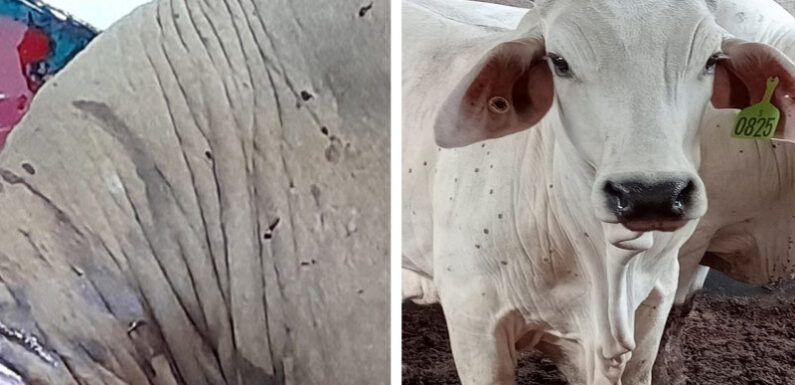
Save articles for later
Add articles to your saved list and come back to them any time.
Singapore/Jakarta: Indonesian officials have revealed Australian cattle with lumpy skin disease (LSD) showed symptoms before being unloaded from ships in Jakarta, heightening their suspicion over where they were infected.
Indonesia has suspended shipments from live cattle imports from four Australian facilities as a result of the presence of the highly contagious disease in 13 animals between May and July.
A photograph of one of the 13 Australian cattle which tested positive to lumpy skin disease.
The Australian government has been adamant that the cattle could not have been infected in Australia and that the country remains free of LSD, an outbreak of which has been forecast to come at a $7.39 billion cost to the economy.
Australian authorities have suggested the cattle spent several days in yards in Indonesia, where LSD has been detected since February 2022 and since spread to 15 provinces, and they believe it is likely that they contracted the disease in the time they spent there.
However, Indonesia’s Agriculture Quarantine Agency is at odds with Australia on the origin of the virus in the cattle as a 60-day investigation is undertaken into its source by both countries.
“If upon arrival they were already infected, the possibility is that the disease was carried from there,” said agency chief Bambang, who like many Indonesians goes by one name.
“I think objectively Australia, we hope [should] carry out laboratory analysis in their farms. If it is true, say it’s true, if it is not, let’s work together to find where it comes from.”
Bambang said the affected cattle were tested within two days of being shipped to Indonesia and then vaccinated if healthy.
LSD does not affect humans, however, in animals “severely affected” by the disease lesions can develop in the respiratory and gastrointestinal tract with pneumonia “a common, and often fatal, complication”, according to Agriculture Victoria.
Indonesia’s detection of LSD has thrown a potential spanner in the works of Australia’s $900 million cattle trade to Indonesia and the $1.4 billion live cattle export industry.
Indonesian officials said the cattle showed symptoms such as lumps on their skin.
Indonesian quarantine personnel had examined the cattle while they were still onboard vessels at Jakarta’s Tanjung Priok port and found LSD symptoms, added Wisnu Wasisa, head of the Indonesian agency’s centre for animal quarantine and animal biosafety, by text message on Tuesday night.
“It did not happen in Indonesia,” he said of the disease contraction.
The possibility has been raised that the cattle could have been infected while en route from Australia to the Jakarta port by sea, which typically takes five days.
But according to the Indonesian quarantine agency boss that was only a slim possibility because of the incubation period of the disease, which is transmitted by mosquitoes, flies and other insects. It is ordinarily between four and 14 days but can be as long as 28 days.
Biosecurity officials had been on high alert in the past year in a bid to prevent an Indonesian outbreak of foot and mouth disease in cattle crossing into Australia with inevitably devastating consequences.
It has come as a surprise then that a suspension has been imposed from the Indonesian side over LSD, which also threatens to cause crushing production losses.
But the Australian government said it was confident in its track record.
“We have never had a positive detection on our shores,” Agriculture Minister Murray Watt said in a statement on Monday.
“Australian officials are working with Indonesian authorities to reassure them that all animals exported from Australia comply with all Indonesian requirements.”
Testing is taking place at the four cattle yards in question but Australia’s chief veterinarian, Mark Schipp, has also maintained there has been nothing to indicate the infections occurred in Australia. He told The Australian on Monday the test used by Indonesia was sensitive and could make early detections.
“Given the presence of LSD in Indonesia, positive results in cattle post arrival in Indonesia are not unexpected,” he said in an earlier statement after the Indonesian suspension was announced.
“As Australia remains LSD free, a detection of LSD in another country – such as Indonesia – does not change Australia’s animal health status.”
While Indonesia has placed a hold on trade from four live exporters in northern Australia, it is continuing to import live cattle from 56 other Australian producers.
Indonesia, which is by far Australia’s top live export market, imported 303,867 head of cattle from Australia last year and 153,384 this year between January and the end of July.
Bambang said he did not want the Australian industry to be panicked by Indonesia’s decision to suspend imports from the four farms and hoped both countries could approach the dilemma “in a positive way”.
Australia has donated almost 1 million doses of LSD vaccine to Indonesia in the past 18 months as well as four million doses of foot and mouth vaccine.
Get a note directly from our foreign correspondents on what’s making headlines around the world. Sign up for the weekly What in the World newsletter here.
Most Viewed in World
From our partners
Source: Read Full Article

